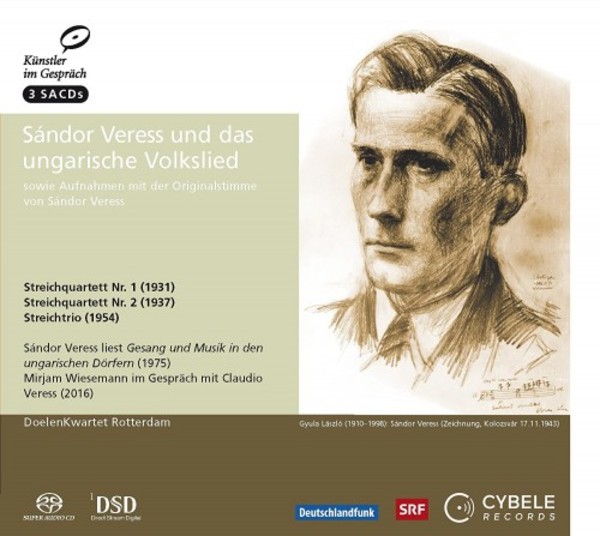
Artists in Conversation Vol.9: Sandor Veress and Hungarian Folksong
£23.70
Usually available for despatch within 3-5 working days
Despatch Information
This despatch estimate is based on information from both our own stock and the UK supplier's stock.
If ordering multiple items, we will aim to send everything together so the longest despatch estimate will apply to the complete order.
If you would rather receive certain items more quickly, please place them on a separate order.
If any unexpected delays occur, we will keep you informed of progress via email and not allow other items on the order to be held up.
If you would prefer to receive everything together regardless of any delay, please let us know via email.
Pre-orders will be despatched as close as possible to the release date.
Label: Cybele
Cat No: CYBELE3SACDKIG009
Format: Hybrid SACD
Number of Discs: 3
Genre: Chamber
Release Date: 20th October 2017
Contents
Artists
Sandor VeressDoelenKwartet Rotterdam
Works
String Quartet no.1String Quartet no.2
String Trio
Artists
Sandor VeressDoelenKwartet Rotterdam
About
- Sándor Veress reads Vocal and Instrumental Music in Hungarian Villages (1975)
- Mirjam Wiesemann in Conversation with Claudio Veress (2016)
Edition Artists in Conversation Vol.9: Art Is Not a Police State (Sándor Veress). This comment by the Hungarian composer Sándor Veress, referring to his very free approach to twelve-tone techniques in his music, is cited by his son Claudio (SACD 3) of the present edition. However, one could just as easily ascribe it to the political and personal circumstances with which Sándor Veress was confronted along his life’s adventurous path, which compelled him to a life in exile in the end: he grew up and was educated in Budapest; as a young man, he went to Berlin, London and Rome before becoming a political émigré at the end of the 1940s and finding, through several strokes of luck, a new home in Bern. The theme of being rooted, of origins and originality, also musically, preoccupied him throughout his life, as was particularly evident in his field research in Moldavian villages, on which he worked intensively even as a 23-year-old. With meticulousness and passion he documented the wealth of Hungarian song, both on paper and with the Edison phonograph, and this research infused his compositions, unmistakably perched on the threshold between folksong, the contrapuntal tradition up to the point of modernism and, from 1950, the twelve-tone method. This approach is also reflected in his two String Quartets and his String Trio (SACD 1).
The preservation of Hungarian folksong, which was exclusively passed on orally from generation to generation, was so important to Veress that he devoted an extensive radio broadcast to the subject for Schweizer Radio DRS in 1975 (SACD 2/3), in which the composer gives a personal report of his collecting trips as a young man, especially those in Moldavia, as well as the results of research into Hungarian musical ethnography, with which he had been closely associated as assistant to Bartók at the Hungarian Academy of Sciences starting in 1935. The recordings on which Veress relies in the broadcast were published in the late ’30s as part of a large-scale Bartók-initiated project of shellac discs. Veress is enthusiastic in his comments on and analysis of these recordings, and explores in detail the intersection of folk music and archaic customs in his homeland.
Claudio Veress talks to Mirjam Wiesemann (SACD 3) about his childhood and youth, his relationship with his father, and his moving, professional and private life marked by travels. He illuminates the Hungarian roots of the family as well as the influences of folk tradition and twelfton music on the work of his father and tells of his father's love for Märklin railways and the letter writing.
Error on this page? Let us know here
Need more information on this product? Click here